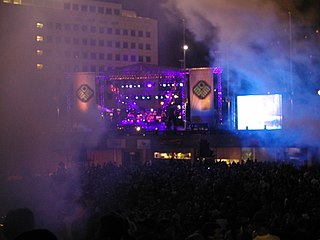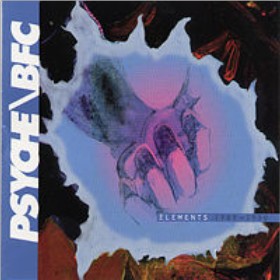House is a genre of electronic dance music characterized by a repetitive four-on-the-floor beat and a typical tempo of 115–130 beats per minute. It was created by DJs and music producers from Chicago's Black gay underground club culture and evolved slowly in the early/mid 1980s as DJs began altering disco songs to give them a more mechanical beat. By early 1988, House became mainstream and supplanted the typical 80s music beat.
Electronica is both a broad group of electronic-based music styles intended for listening rather than strictly for dancing and a music scene that came to prominence in the early 1990s in the United Kingdom. In the United States, the term is mostly used to refer to electronic music generally.

An animator is an artist who creates multiple images, known as frames, which give an illusion of movement called animation when displayed in rapid sequence. Animators can work in a variety of fields including film, television, and video games. Animation is closely related to filmmaking and like filmmaking is extremely labor-intensive, which means that most significant works require the collaboration of several animators. The methods of creating the images or frames for an animation piece depend on the animators' artistic styles and their field.
Electric blues is blues music distinguished by the use of electric amplification for musical instruments. The guitar was the first instrument to be popularly amplified and used by early pioneers T-Bone Walker in the late 1930s and John Lee Hooker and Muddy Waters in the 1940s. Their styles developed into West Coast blues, Detroit blues, and post-World War II Chicago blues, which differed from earlier, predominantly acoustic-style blues. By the early 1950s, Little Walter was a featured soloist on blues harmonica using a small hand-held microphone fed into a guitar amplifier. Although it took a little longer, the electric bass guitar gradually replaced the stand-up bass by the early 1960s. Electric organs and especially keyboards later became widely used in electric blues.
Detroit techno is a type of techno music that generally includes the first techno productions by Detroit-based artists during the 1980s and early 1990s. Prominent Detroit techno artists include Juan Atkins, Eddie Fowlkes, Derrick May, Jeff Mills, Kevin Saunderson, Blake Baxter, Drexciya, Mike Banks, James Pennington and Robert Hood. Artists like Terrence Parker and his lead vocalist, Nicole Gregory, set the tone for Detroit's piano techno house sound.

Yellow Magic Orchestra was a Japanese electronic music band formed in Tokyo in 1978 by Haruomi Hosono, Yukihiro Takahashi and Ryuichi Sakamoto. The group is considered influential and innovative in the field of popular electronic music. They were pioneers in their use of synthesizers, samplers, sequencers, drum machines, computers, and digital recording technology, and effectively anticipated the "electropop boom" of the 1980s. They are credited with playing a key role in the development of several electronic genres, including synthpop, J-pop, electro, and techno, while exploring subversive sociopolitical themes throughout their career.

Movement Electronic Music Festival is an annual electronic dance music event held in the birthplace of Techno, Detroit, each Memorial Day weekend since 2006. Previous electronic music festivals held at Hart Plaza on Memorial Day weekend include Detroit Electronic Music Festival (2000–2002), Movement (2003–2004) and Fuse-In (2005). The four different festival names reflect completely separate and distinct producers, brands and directions. All of these festivals presented performances by musicians and DJs that emphasized the progressive qualities of the culture surrounding electronic music including the celebration of Detroit being the birthplace of the popular electronic music subgenre Techno.
Ambient techno is a subgenre of techno that incorporates the atmospheric textures of ambient music with the rhythmic elements and production of techno. It was pioneered by 1990s electronic artists such as Aphex Twin, Carl Craig, The Orb, The Future Sound of London, the Black Dog, Pete Namlook and Biosphere.
Shake, The Shakes, Shaking, or Shakin' may refer to:

The music of Angola has been shaped both by wider musical trends and by the political history of the country. while Angolan music has also influenced the music of the other Lusophone countries and Latin American countries. In turn, the music of Angola was instrumental in creating and reinforcing "angolanidade", the Angolan national identity. The capital and largest city of Angola — Luanda — is home to a diverse group of styles including kazukuta, semba, kizomba and kuduro. Just off the coast of Luanda is Ilha do Cabo, home to an accordion and harmonica-based style of music called rebita.
Electro is a genre of electronic dance music directly influenced by the use of the Roland TR-808 drum machines, with an immediate origin in early hip hop and funk genres. Records in the genre typically feature heavy electronic sounds, usually without vocals; if vocals are present, they are delivered in a deadpan manner, often through electronic distortion such as vocoding and talkboxing. It palpably deviates from its predecessor boogie by being less vocal-oriented and more focused on electronic beats produced by drum machines.
Hi-NRG is a genre of uptempo disco or electronic dance music (EDM) that originated during the late 1970s and early 1980s.

Analogue Bubblebath, also released as Aphex Twin ep, is the first record by musician and producer Richard D. James. The EP was released under his alias The Aphex Twin through Mighty Force Records in September 1991. It was the inaugural release for the label, which at the time was a record shop in Exeter. The record was hugely influential on the development of electronic music, particularly techno and ambient techno. Its release has been described as a key event in the history of dance music. It is the first release in what became the Analogue Bubblebath series.
Metroplex is an American techno record label in Detroit, Michigan, United States, founded in 1985 by techno pioneer Juan Atkins. Juan Atkins did most of his work for the label under the pseudonyms Model 500 and Infiniti, and will occasionally use such names for live acts.
Blake Baxter is an American techno musician, associated with the first wave of Detroit techno. AllMusic called him "perhaps the most underrated figure" of the early Detroit techno scene.

Michael Anthony Banks, better known as "Mad" Mike Banks, is an American record producer. He is the co-founder, along with Jeff Mills, of record label Underground Resistance and was a key player in the "second generation" of Detroit techno.
Techno is a genre of electronic dance music which is generally produced for use in a continuous DJ set, with tempos being in the range from 120 to 150 beats per minute (BPM). The central rhythm is typically in common time (4/4) and often characterized by a repetitive four on the floor beat. Artists may use electronic instruments such as drum machines, sequencers, and synthesizers, as well as digital audio workstations. Drum machines from the 1980s such as Roland's TR-808 and TR-909 are highly prized, and software emulations of such retro instruments are popular.

Detroit, Michigan, is a major center in the United States for the creation and performance of music, and is best known for three developments: Motown, early punk rock, and techno.

Techno! The New Dance Sound of Detroit is a 1988 compilation of early Detroit techno tracks released on the Virgin Records UK imprint 10 Records. The compilation's title helped establish the term "techno" as the name for electronic dance music emerging out of Detroit in the 1980s.

Elements 1989–1990 is a 1996 compilation of early recordings by Detroit techno musician Carl Craig, released under the pseudonyms Psyche and BFC. It was released on Craig's label Planet E Communications and reissued in 2013.








